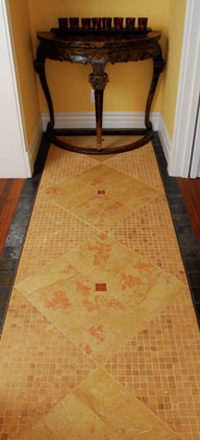


Frequently Asked Questions about Tile
Q - How much do you charge to set tile?
This is a question I get asked a lot. Many variables can affect the price of an installation. Such as: the tile type, size, pattern, amount of demolition, preparation, and cutting, for example. I can answer the question of cost only after I know these variables.
Q - I have cracks in my slab. Can I still use tile?
Small cracks +/- 2 mm. are fairly common in slab floors. An installer can easily remedy them with a simple process called "slip sheeting." Whereby a thin material is adhered to the slab at the crack so that the tiles do not directly touch the area of the crack. Large cracks (> 4 mm) and vertical movement of the slab on one side of a crack are potentially more serious and may have to be repaired by a specialist contractor prior to the installation of tile.
Q - Can I tile over a plywood floor?
Typically a plywood floor can be tiled over. It should be smooth, flat and free of large humps and dips as these will only show up
more once tiles are installed. Hardwood and particle board do not make acceptable substrates for tile installation.
Q - Is a mortar bed better than a pre-fabricated cement panel for the installation of wall tile?
Yes, mortar or "mud" is still the best substrate for tile installation. While cement panels mimic the undesirable contours of whatever they are nailed to, mortar is always perfectly flat, plumb, level and unaffected by moisture. As an added dividend, mortar is monolithic. Which
means a greatly reduced chance of grout joints cracking at the corners i.e. where two walls meet.
Q - Do I need another contractor to remove my carpet and furniture before you tile my floor?
No, I can remove all types of floor covering, furniture and appliances.
Q - Can you reinstall my sink after you tile my counter?
Yes, I can reinstall the existing, or install new sinks, faucets as well as toilets.
Q - Should I expect a lot of dust?
I hate dust in my own home. I do everything I can to prevent dust on the job. Such as using large fans to exhaust air, covering furniture, sealing off rooms and using the natural flow of air when favorable. Nevertheless, when there is a lot of demolition, a little dust is inevitable.
Q - Do I need to seal my tile?
Glazed tile will not accept sealer. Stone tile may be sealed after installation. Grout may also be sealed. Sealer will not prevent tile/grout from becoming dirty, but will make clean up more effective. It is almost useless to seal outdoor tile as the elements breakdown even a good sealer within months. Sealers do not protect soft stone from etching caused by acidic foods.
Q - How do I know if the floor tile I like will be strong enough?
Although some floor tiles are stronger than others, all mass produced floor tiles will be strong enough for residential use. The variations in floor tile price are less indicative of strength than they are aesthetics.
Click HERE for more information on choosing floor tile.
Q - My shower pan is leaking. Do I need to replace the whole shower?
Often people assume the pan is leaking because they see water damage on the ceiling below or in an adjacent room. To determine conclusively if indeed the leak stems from the pan and not the drain, water lines or shower door, the installer may need to perform some tests which will isolate the source of the leak. Usually it is possible to replace only the lower portion of the shower. And if the same tile is still available, a skilled installer can complete the installation without any telltale signs that it has been repaired. If the shower has been leaking for some time moisture may have wicked up the studs. In this event the whole shower may need to be removed to gain access to the framing. Simply caulking any cracks in the shower tile will not be successful.
Q - Why does stone tile cost more to install?
First, unlike man-made tile, stone tile is usually installed with a very tight joint. This makes it more apparent when two adjacent tiles are not flush. Similarly, the edges of stone tile are square and hard while man-made tile usually has a slightly rounded or cushioned edge helping further to conceal slight height differences between tiles. Often stone tile needs to be sorted and sealed. And stone tile can break without warning just at the wrong time during installation!
Q - What are the advantages of stone tile?
Because each piece has unique shade variations, stone tile has an inherently rich look. It's been used for hundreds of years so if it's used tastefully it's unlikely to go out of style soon. The color goes all the way through so small chips don't stand out. It's elegant and can make a big statement in small areas such as an entry or fireplace.
Click HERE for more information on choosing your stone.
![]()
Contact us for your next project!
Christopher Linback Tile
2766 Barnson Place
San Diego, CA 92103
(619) 471-4291
chrislinback@gmail.com
Licensed Contractor #422835